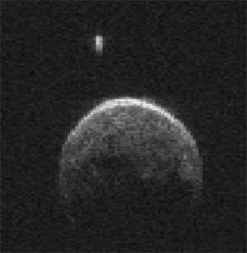The Earth was buzzed this week at 50,000 kilometres per hour by the 300 metre wide asteroid 2004 BL86, which, new images reveal, even has its own moon!
The distance to the passing "near Earth object" - NEO for short - was more than a million kilometres, well over twice the distance to the Moon, so 2004 BL86 is not regarded as a threat to Earth, but astronomers were afforded an excellent opportunity to observe the passing asteroid, which is when radar images pinpointed a tiny 70m satellite in orbit around its rocky parent.
The trajectory measurements on the objects confirm that this will be our closest encounter with them for at least another 200 years, but in the nearer term the much larger 1km asteroid 1999 AN10 will sweep past in 2027 at the much closer distance of 300,000 kilometres, followed, two years later, by the arrival of the half a kilometre wide asteroid Apophis, which will brush past the Earth at an altitude of 30,000 kilometres, inside the orbits of some satellites.
Objects on this scale are capable of causing serious damage to the Earth if they impact. The shockwave triggered by the break up of the Chelyabinsk meteor over Russia in February 2013 injured nearly 2000 people, most of them hit by flying glass. Significantly, that object measured only 20 metres across, and no one saw it coming.
Scientists are aware of - and are tracking - the positions and trajectories of at least 12,000 NEOs, 1000 of them over 1 kilometre across and 1500 of them considered a potential threat, although at this stage the Earth is not considered to be at risk.
That hasn't stopped scientists planning for the worst though, and work is on-going to develop strategies to deflect would-be impactors away from an Earth-bound course. The only downside is that we need at least 5 years notice to do so, so astronomers had better keep their eyes - and telecopes - trained on the skies...










Comments
Add a comment